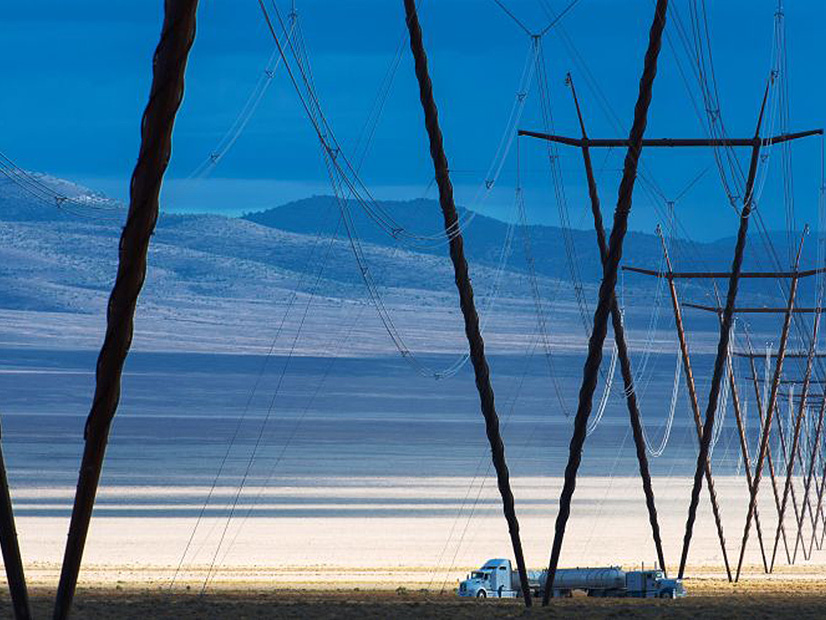
Nevada is poised to be at the center of a robust and interconnected transmission system in the Western U.S., but the state must move quickly, the chairman of a new task force said Tuesday.
Speed is necessary because of the extended time it takes to develop new transmission projects, said Nevada state Sen. Chris Brooks (D), who chairs the Regional Transmission Coordination Task Force. The group held its first meeting on April 26.
And Nevada faces competition from other states, Brooks noted.
“We are not alone in this,” Brooks said. “We are in a race with our neighboring states to really take full advantage of our position here in the West.”
During the 2021 session Brooks was the sponsor of Senate Bill 448, wide-ranging energy legislation that included creation of the task force. Gov. Steve Sisolak signed the bill into law in June and appointed the group’s members in December. (See Nevada Gov. Sisolak Appoints Regional Tx Task Force.)
SB 448 requires transmission providers in the state to join a regional transmission organization by Jan. 1, 2030, although providers may be able to receive a waiver of the deadline.
The task force’s work will complement that goal. The mission of the 21-member panel is to advise the governor and lawmakers on the potential costs and benefits of the state joining or forming an RTO.
The group will explore policies that would support the state entering an RTO by Jan. 1, 2030.
It will look at the siting of transmission facilities needed to reach the state’s clean energy and economic development goals.
And it will evaluate which businesses and industries could move to the state once it enters an organized, competitive regional wholesale electricity market.
The group will prepare a report to the Legislature, which is due by Nov. 30. Another meeting is scheduled on Oct. 12, and the group is expected to meet again after that to vote on a final report.
Brooks said there’s also an option for the task force to form working groups to tackle specific topics.
Member Perspectives
The group’s first meeting featured overviews of electric transmission and wholesale markets, and it also heard about Nevada’s existing transmission network and the status of projects in the pipeline.
Task force members introduced themselves and shared their perspectives on a regional transmission system.
Mona Tierney-Lloyd, head of U.S. policy for Enel North America, is the geothermal industry’s representative on the task force. Enel’s projects in Nevada include the Salt Wells geothermal plant and Stillwater, a combined solar and geothermal facility.
Tierney-Lloyd said Enel has “a very strong interest” in the creation of an RTO, which would deliver economic opportunity, boost system efficiency and increase reliability. It would also provide an avenue for developing demand-side technologies, she said. “Having a strong transmission grid is really the backbone for providing development of those resources.”
Kris Sanchez, deputy director of the Governor’s Office of Economic Development, said his office has been looking at how to ensure Nevada’s economic vitality coming out of the pandemic.
“One of the things that we recognized is that Nevada needed to start really investing in … looking at what we would need to make sure that the state was strong moving forward, and that we grow jobs in these critical industries like energy and transmission,” Sanchez said.
As a representative of the Bureau of Consumer Protection in the Office of the Attorney General, Consumer Advocate Ernest Figueroa said his goal is to maximize ratepayer benefits. Figueroa is a non-voting member of the task force.
Economic Benefits
Task force member Leslie Mujica, executive director of Las Vegas Power Professionals, a nonprofit focused on workforce development, represents the general public on the panel.
She said Nevada can become a leader in renewable energy and electrification.
“Most importantly … there are billions of dollars ready to be spent and invested in our state that will create not only high-paying jobs, but careers, long-term careers,” Mojica said.
John Seeliger, regional energy manager for Nevada Gold Mines, represents the mining industry on the task force. The mining industry is very energy-intensive, he said, and it’s looking at ways to decarbonize.
“We’re very interested in making sure we have a stable and robust transmission system,” Seeliger said.



